How and When Nigeria Can Exit the AFCFTA. Daily Law Tips (Tip 757) by Onyekachi Umah, Esq., LL.M, ACIArb(UK).
Introduction:
Imagine Africa as one single market, that promotes intra-Africana trade, that will be the world largest free trade zone! The African Continental Free Trade Area (AfCFTA) is Africa’s move to harmonies its markets for economic integration, across all 55 member States of the Africa. Since 1st January 2021, Africa has been a single market. The entire process is running in phases and will require member states (African countries) to amend their laws and policies to encourage free movement of persons and goods, as well as affect dispute resolution, investment, competition policies, and intellectual property. Among its highlights will be the African passport, the African currency, the Single African Air Transport Market and other unified systems.
Nigeria signed and ratified the Agreement for the establishment of the African Continental Free Trade Area (AfCFTA) very late, due to fears that AFCFTA will not benefit Nigeria. The giant of Africa was or is still scared that the AFCFTA may turn Nigeria into a dumping ground and that Nigeria lacks needed trade infrastructure, security and system to cope with the opportunities and challenges of the AFCFTA. In a simple parlance, many Nigerians felt or feel that the AFCFTA may cause an immeasurable rush of Africans into Nigeria to compete with Nigerians over the limited resources in Nigeria. Many fear that Nigeria, like the United Kingdom that left the European Union, may have a quick need to break out of the African Union’s AFCFTA. Hence, I have received questions from several Nigerians, who wonder if Nigeria can exit the AFCFTA and how/when such can be done. So, this work focuses on the timing and procedure for Nigeria or any member state to exit the AFCFTA.
AFCFTA and the Right to Exit:
Agreement for the establishment of the African Continental Free Trade Area is a legal framework (combination of agreements, protocols, annexes and their appendices) covering trade in goods, trade in services, settlement of dispute, Competition policies, Investment and Intellectual Property Rights. African countries interested in the African Continental Free Trade Area (AfCFTA) sign to the agreement and protocols to become member states. So far, 54 African countries out of 55, have signed and approved the establishment of the African Continental Free Trade Area (AfCFTA). The outstanding country is Eritrea and could not sign due to its war with Ethiopia but is now ready to sign.
Like any other civil agreement, the agreement for the establishment of the African Continental Free Trade Area allows for member states to exit the agreement. However, there are deadlines and procedures for such for such exit. A copy of the Agreement for the establishment of the African Continental Free Trade Area solves this; specifically, at its Article 27 on Withdrawal. The agreement refers to an exit as a withdrawal. Click to download a free copy of the AFCFTA agreement here.
The agreement provides that after five (5) years from the date a state member signed the agreement, the state member may withdraw from the agreement. And, the withdrawal is to be made by giving notice to all other state members through the Depositary (ie, the Chairperson of the African Union Commission). However, the withdrawal will not be effective until after two (2) years from the date that the withdrawing state member delivered its notice to the depositary. As expected, withdrawal from the agreement does not affect any pending rights and obligation of the withdrawing member state before the withdrawal.
In the case of Nigeria, Nigeria signed the Agreement for the establishment of the African Continental Free Trade Area on 7 July 2019, ratified it on 11 November 2020 and deposited it on 5 December 2020. By the constitution of Nigeria, foreign agreements signed by government are not effective until there are ratified by the legislature. So, since the AFCFTA was ratified by Nigeria on 11 November 2020, it is deemed to have come into force in Nigeria on the date of ratification (11 November 2020). So, Nigeria cannot exit the agreement until after 5 years from 11 November 2020 (ie, from 11 November 2025). It is from 11 November 2025 that Nigeria can send its Notice of Withdrawal but the withdrawal will not be effective until after 2 years (ie, November 2027, assuming Nigeria submits the notice in November 2025).
Conclusion:
No country can survive without trade and relationships with other countries. Like the Igbo adages says, “Ayoku mamiri, Ogba Ufufu” (when people urinate together in same bowl, it foams better); countries do better together. This is the simple basis for a single African market for all Africans. Nigeria must not miss the promises of AFCFTA, with the projections that AFCFTA will cover a market of 1.2 billion people and a gross domestic product (GDP) of $22.5 trillion, across all 55 member States of the African Union.
Although, Nigeria lacks basic data, basic infrastructure, reliable economic plan, technology-industrial hubs and security to drive needed export of finished goods and not raw materials alone, the world and Africans cannot be delayed. Nigeria has to catch up. AFCFTA is good but Nigeria has to be ready and good to benefit from its goodies. However, where Nigeria or any member state of the AFCFTA feels that its national security, public health or public order is threatened, it can always step aside from the AFCFTA. Like we say in Nigeria, “e no be by force” (it is not by force) to be with the AFCFTA.
My authorities, are:
- Sections 1, 2, 3, 4, 5, 6 and 12 of the Constitution of the Federal Republic of Nigeria, 1999.
- Articles 2, 6, 7, 8, 13 and 27 of the Agreement establishing the African Continental Free Trade Area. Click to download a free copy of the AFCFTA agreement here.
- African Trade Policy Centre “African Continental Free Trade Area; Questions & Answers” (African Union) <https://au.int/sites/default/files/documents/36085-doc-qa_cfta_en_rev15march.pdf> accessed 15 March 2021.
- Africa Kiiza and Alex Nkosi, “Does the African Continental Free Trade Area (AfCTA) uphold Worker’s rights?” (Beyond Potential, 17 May 20202) <https://www.beyondpotential.org/post/does-the-african-continental-free-trade-area-afcta-uphold-worker-s-rights> accessed 15 March 2021.
- Martyn Davies and Borge Brende, “Connecting Countries and Cities for Regional Value Chain Integration: Operationalizing the AfCFTA” (World Economic Forum, 26 January 2021) <http://www3.weforum.org/docs/WEF_Regional_Value_Chain_Integration_Automotive_Case_Study_2021.pdf> accessed 15 March 2021.
- Andrew Omosebi, “AfCFTA: The state of the manufacturing sector in Nigeria and its ability to capitalize on open borders” (Naira Metrics, 4 January 2021) <https://nairametrics.com/2021/01/04/afcfta-the-state-of-the-manufacturing-sector-in-nigeria-and-its-ability-to-capitalize-on-open-borders/> accessed 15 March 2021
- “The African Continental Free Trade Area: A Tralac Guide” (Tralac, August 2020) < https://www.tralac.org/documents/resources/booklets/4062-afcfta-a-tralac-guide-7th-edition-august-2020/file.html> accessed 15 March 2021
- Hippolyte Fofack, “A Competitive Africa; Economic integration could make the continent a global player” (International Monetary Fund, 2018) <https://www.imf.org/external/pubs/ft/fandd/2018/12/afcfta-economic-integration-in-africa-fofack.htm> accessed 15 March 2021
- Oge Udegbunam and Ronald Adamolekun, “AfCFTA: What Nigerian businesses must do to export to African countries” (PremiumTimes, 17 January 2021) <https://www.premiumtimesng.com/news/top-news/436908-afcfta-what-nigerian-businesses-must-do-to-export-to-african-countries-official.html> accessed 15 March 2021
- KOUASSI YEBOUA AND REQUIER WAIT, “Free trade deal could boost African manufacturing” (Issafrica, 8 December 2020) <https://issafrica.org/iss-today/free-trade-deal-could-boost-african-manufacturing> accessed 15 March 2021
- https://au.int/en/videos/20210101/afcfta-start-trading-ceremony-webinar
Sabi Law Projects:
#SabiLaw
#DailyLawTips
#SabiBusinessLaw
#SabiElectionLaws
#SabiHumanRights
#SabiLawOnBeatFm
#SabiLawLectureSeries
#CriminalJusticeMonday
#SabiLawVideoChallenge
Speak with the writer, ask questions or make inquiries on this topic or any other via onyekachi.umah@gmail.com, info@LearnNigerianLaws.com or +2348037665878 (whatsapp).
To receive free Daily Law Tips, join our free WhatsApp group via https://chat.whatsapp.com/DgFYxiYw6Mm8MdvOl3N1yn or Telegram group, via the below link: https://t.me/LearnNigerianLaws
To keep up to date on all our free legal awareness projects of Sabi Law Foundation, follow us via
Facebook Page:@LearnNigerianLaws, Instagram: @LearnNigerianLaws, Twitter: @LearnNigeriaLaw and YouTube: Learn Nigerian Laws
Please share this publication for free till it gets to those that need it most. Save a Nigerian today! NOTE: Sharing, modifying or publishing this publication without giving credit to the author or Sabi Law Foundation is a criminal breach of copyright and will be prosecuted. This publication is the writer’s view not a legal advice and does not create any form of relationship. You may reach the writer for more information.
This publication is powered by www.LearnNigerianLaws.com {A Free Law Awareness Program of Sabi Law Foundation, supported by the law firm of Bezaleel Chambers International (BCI).} Sabi Law Foundation is a Not-For-Profit and Non-Governmental Legal Awareness Organization based in Nigeria.




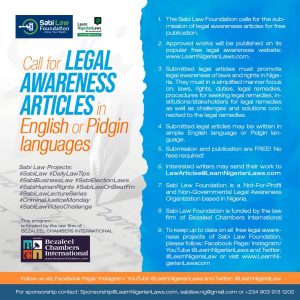









































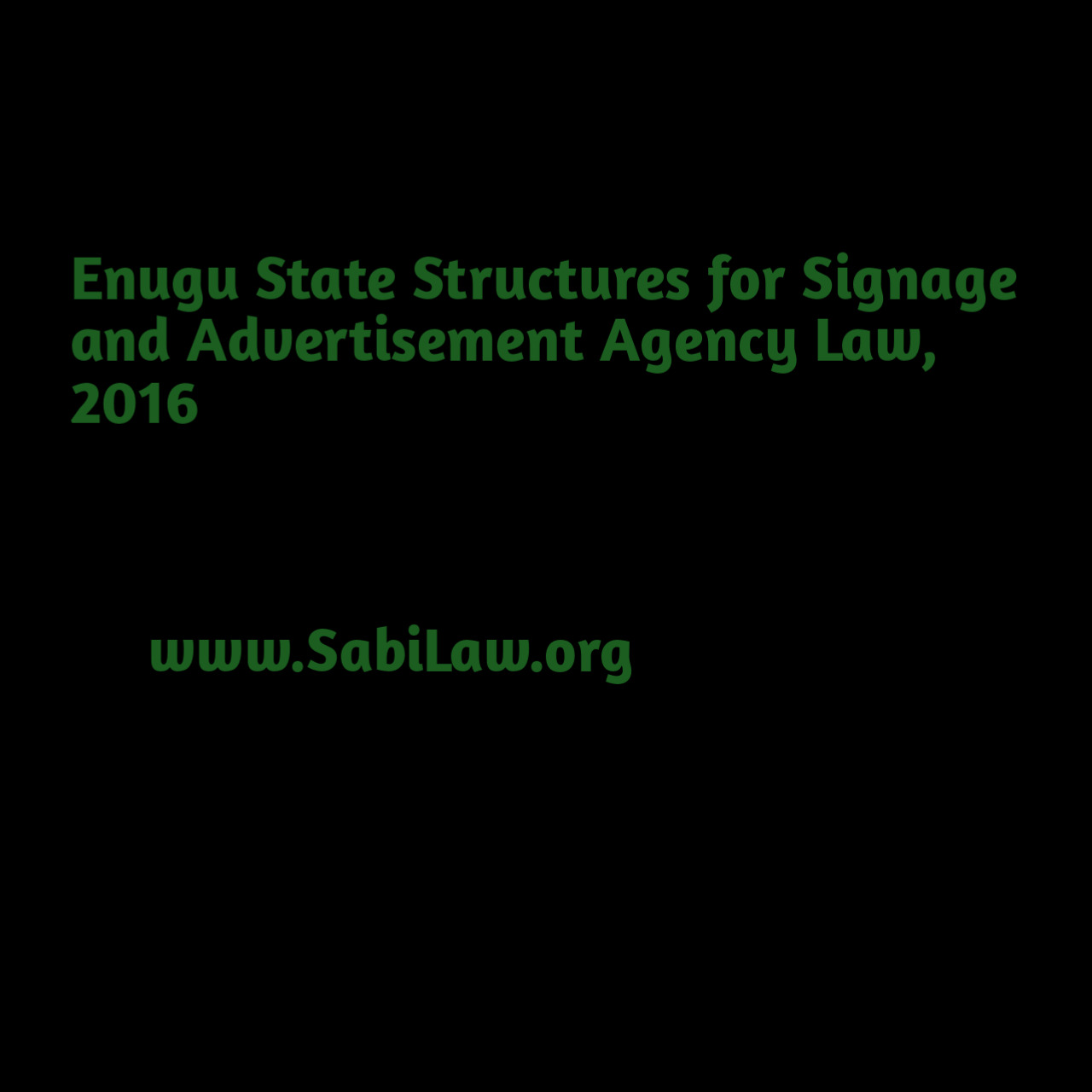

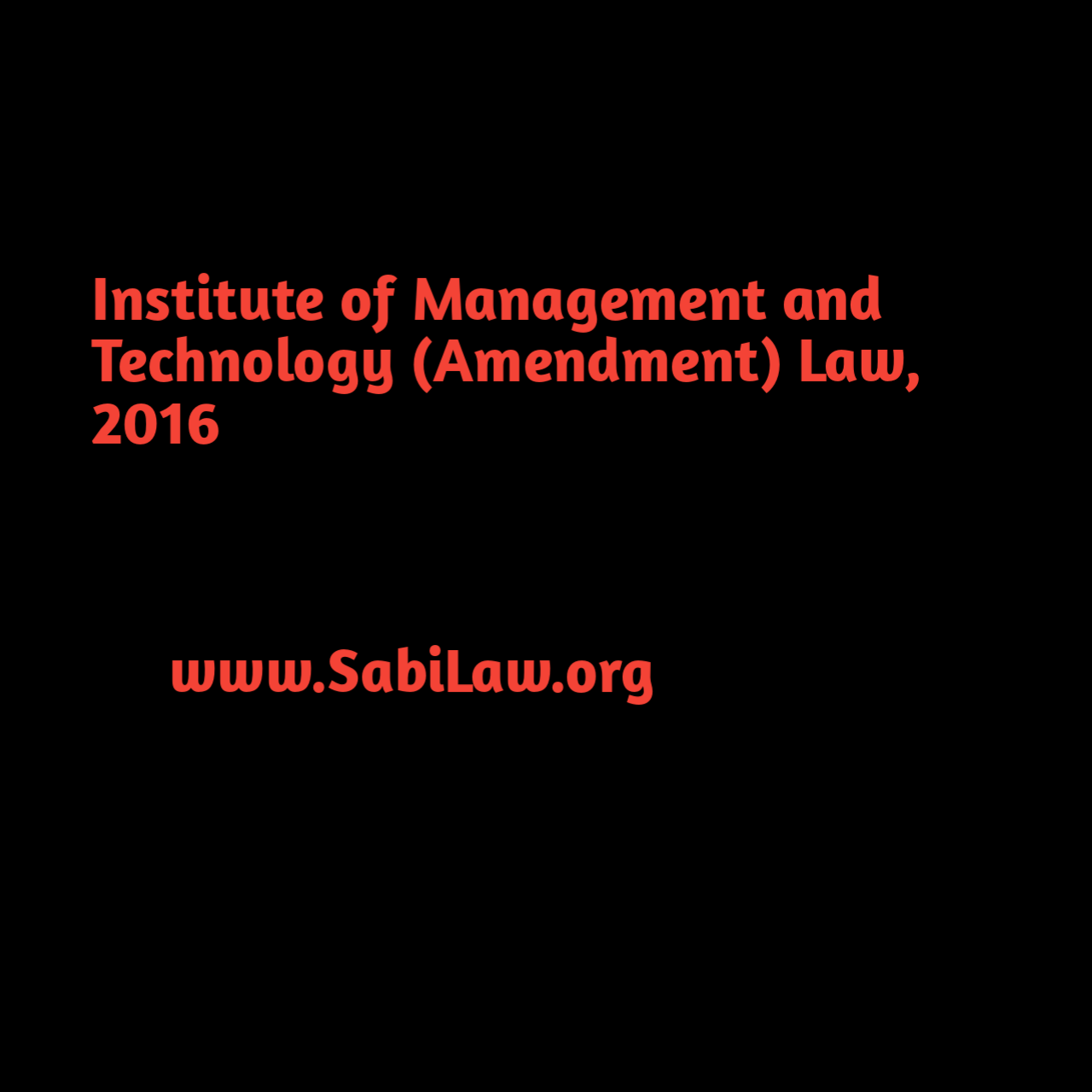


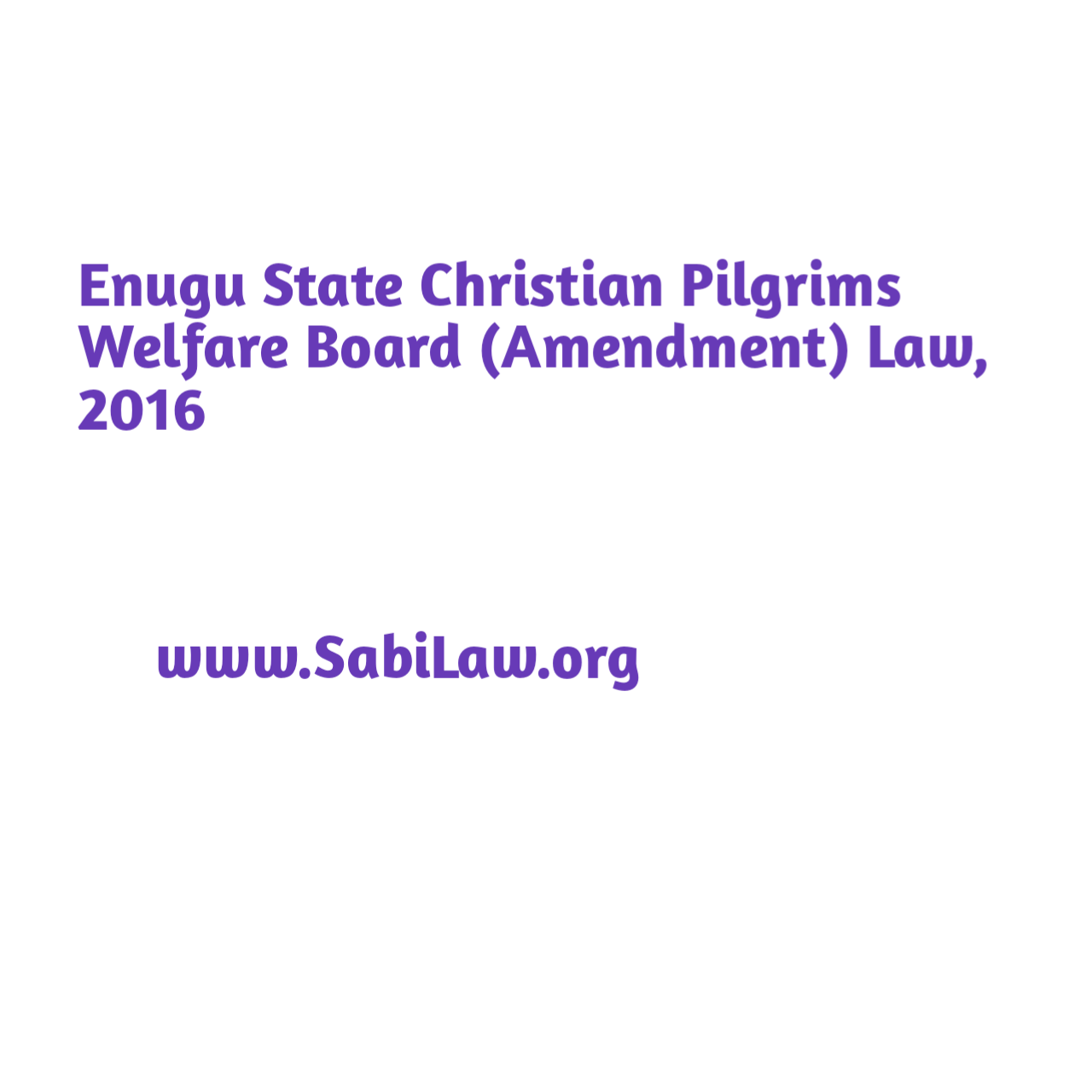
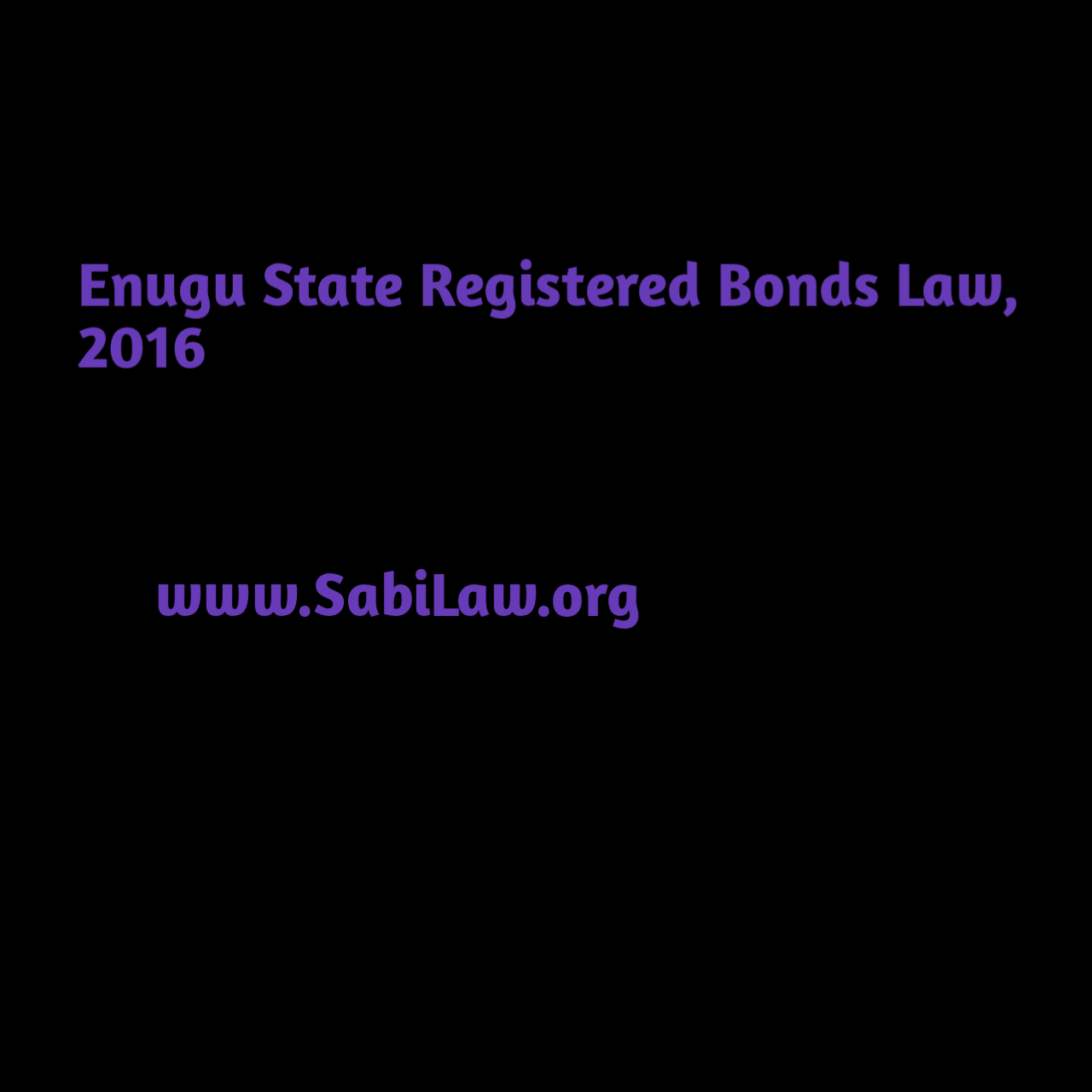
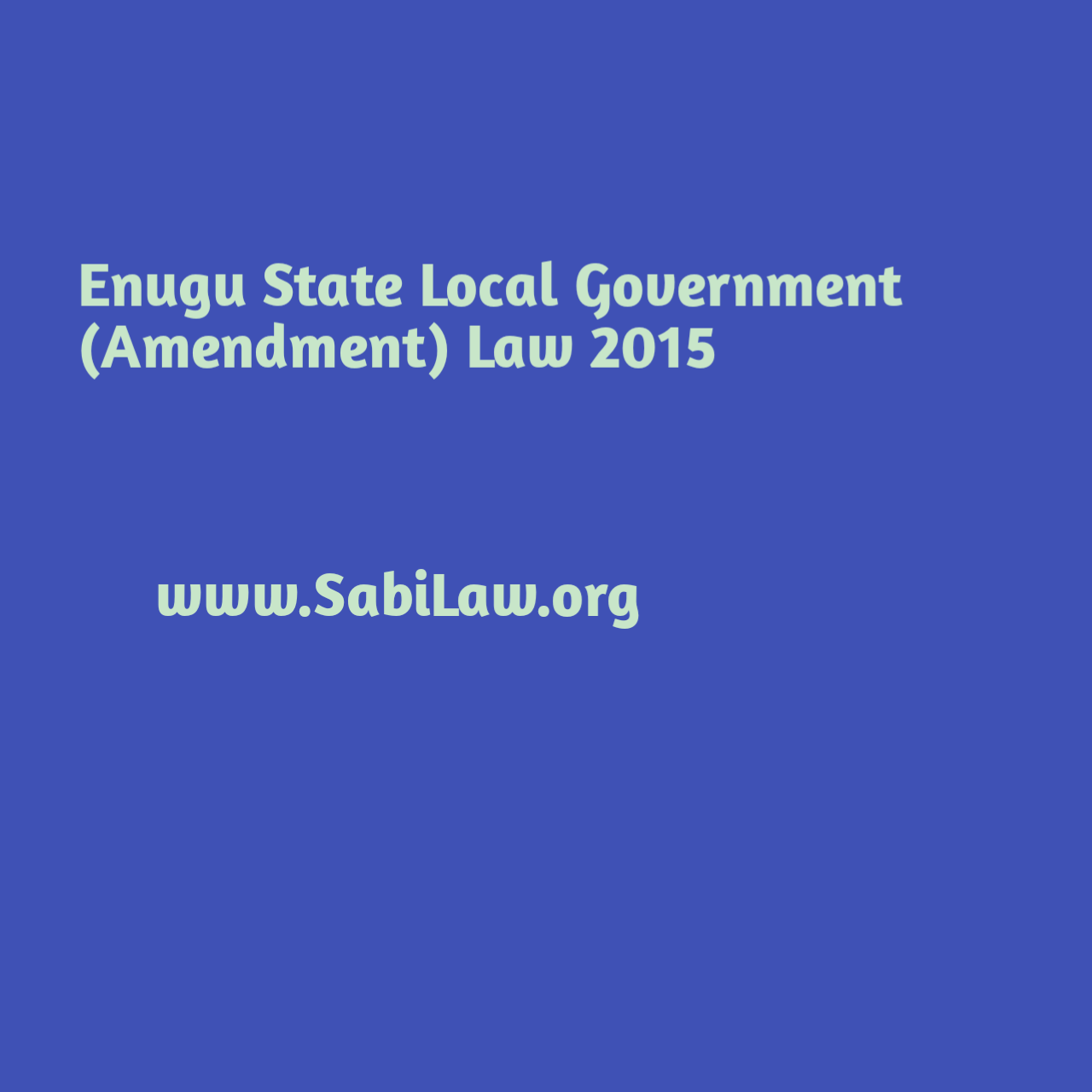
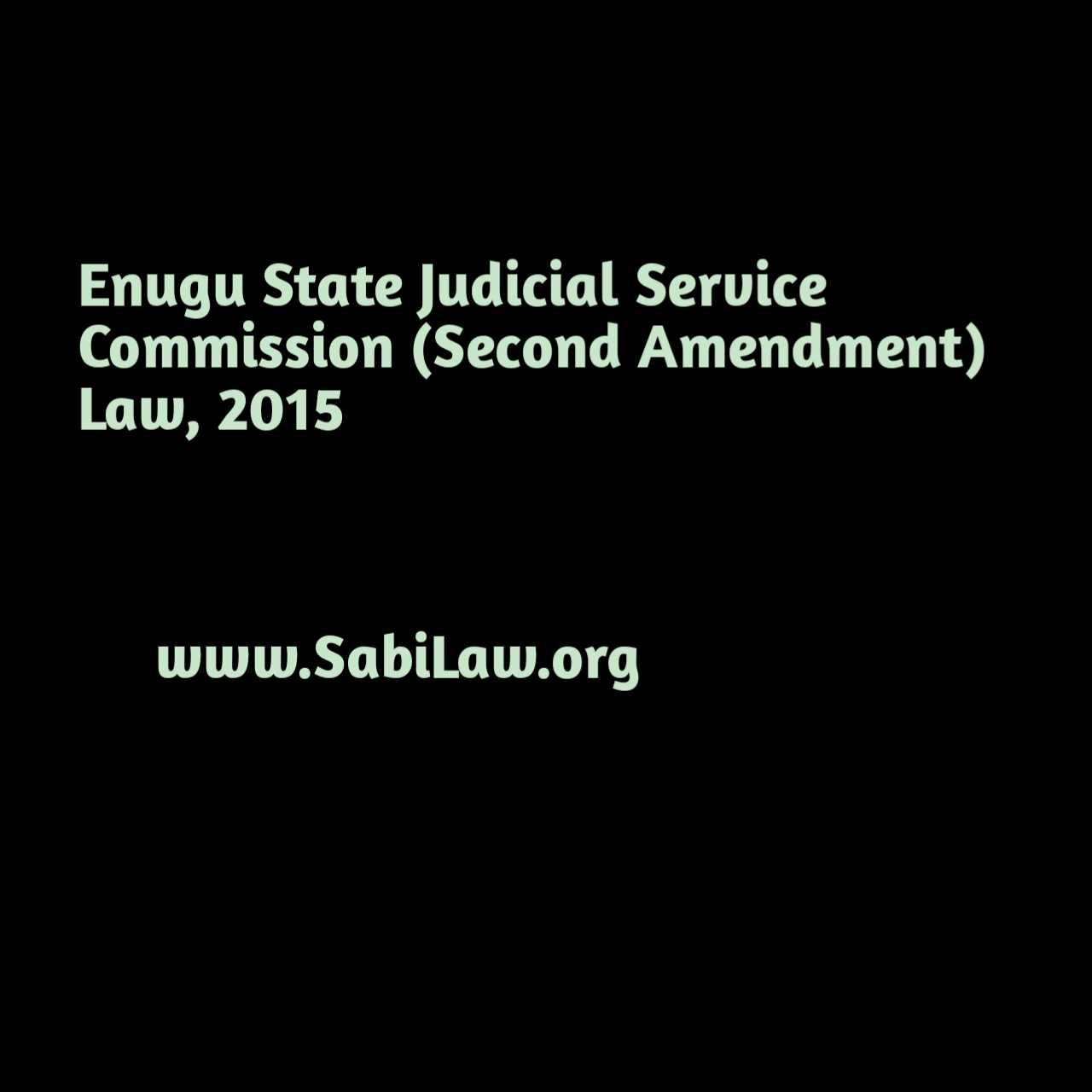
One Response